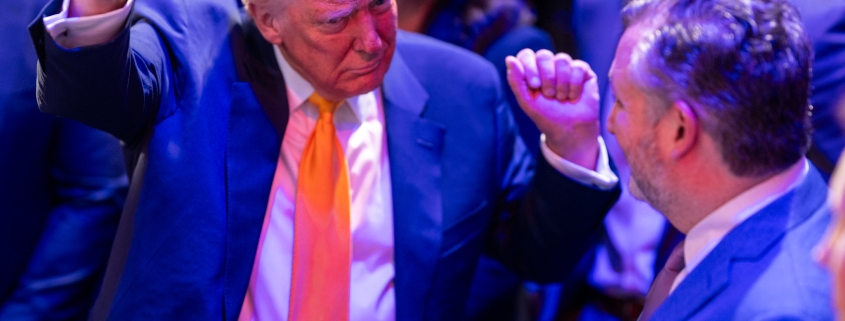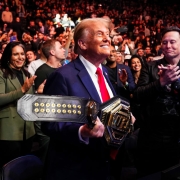Donald Trump’s first three months: rude, raucous and rogue
Sunday marks three months since Donald Trump’s inauguration as US president. What a ride: the style rude, language raucous, and the results rogue.
Beyond manners, rudeness matters because tone signals intent as well as personality.
Trump’s version of going rogue means to leave the herd, or to become savage or destructive. His rogue is about means and policy, shifting where the United States stands and what it stands for.
Manners maketh the man, but means maketh government.
Berating Ukrainian President Volodymyr Zelenskyy in the White House was the rough and rude stuff politicians usually do to each other behind closed doors. The rogue moment of policy significance and shocking symbolism was at the United Nations when the US sided with Russia in voting against resolutions to mark the third anniversary of the full-scale invasion of Ukraine. Trump embraces foes as he throws friends overboard, aiming for a quick peace in Ukraine by giving Russian President Vladimir Putin most of what he wants.
The US president is driven by his will, his wants and his whims. The only metric that counts is power. Get a great deal. Make a profit. Punish enemies.
Trump calls his tariff wall a ‘declaration of economic independence’ that will make the US ‘good and wealthy’. Offering a ‘stupidity theory of tariffs’, Nobel Prize economist Paul Krugman responds that Trump launches ‘a global trade war’, destroying 80 years of credibility in three months with ‘wild zig-zags’.
What’s so challenging about Trump’s style is that zig-zags are the strategy.
The US sets a 145 percent tariff on China’s goods; China’s answers with a 125 percent tariff on US goods. The world’s top two economies impose embargoes on each other. Trump may, indeed, zig to clinch a beautiful deal with China. But the isolationist and nativist standard is set. Trump believes that for decades the US ‘has been looted, pillaged, raped and plundered by nations near and far, both friend and foe alike’.
The US had the largest role in creating today’s world; under Trump the US is scared of the world it made, declaring a pox on Pax Americana.
Trump’s three months show he has learnt from his first term, when the adults in the room were a constant check on his will and whims. A more experienced president leading his remade Republican Party means fewer adult restraints.
Trump’s new treasury secretary, Scott Bessent, qualified for the adult label by getting the president to put a 90-day pause on the reciprocal tariffs announced on 2 April, because the bond market was melting. Wall Street, though, speculates Bessent won’t last long, because the first Trump administration showed that telling adult truths to the wild king soon ends cabinet careers.
Trump now attacks the foundations of Washington to get systemic shifts. He smashes so his vision can arise atop the rubble. In contrast, during the first-term soap opera, courtiers vied to handle the king while Washington kept ticking (many administration jobs were still vacant a year after Trump’s first inauguration).
The president luxuriates in the pomp, while his administration wields sharper authority. He still enjoys the king label, but the court politics forms factions.
Because loyalty is what Trump values most, the true-believer faction gathers around the MAGA cap that reads ‘Trump was right about everything’.
Standing amid the believers are those who see Trump as the perfect instrument to ‘burn down Washington’, as per the original subtitle of a book by the head of the Heritage Foundation on how to institutionalise Trumpism by torching institutions. The foundation created Project 2025 to write the conservative agenda for Trump’s administration ‘to take down the Deep State and return the government to the people’.
The tech bros, led by Elon Musk, want Trump to remove any Washington restraints so algorithms can get on with eating the world. The tech bro discomfort over trade war was voiced by Musk’s attack on Trump’s tariff tsar, Peter Navarro, as ‘dumber than a sack of bricks’. The tech vision of a borderless world crashes against Trump’s love of borders.
The China hawks fly with Secretary of State Marco Rubio and National Security Advisor Michael Waltz. Rubio’s version of Trump foreign policy starts by stating that the post-Cold War period of US unipolar dominance was an ‘anomaly’. Now, Rubio says, the US faces ‘a multipolar world, multi-great powers in different parts of the planet. We face that now with China and to some extent Russia, and then you have rogue states like Iran and North Korea you have to deal with.’
The view that the US is no longer as powerful as it was is Trump’s central argument. His answer is America First. The fear for allies is the prospect expressed by Australia’s previous ambassador to the US, Arthur Sinodinos, that this might become America Only.



